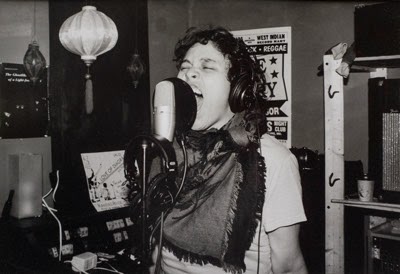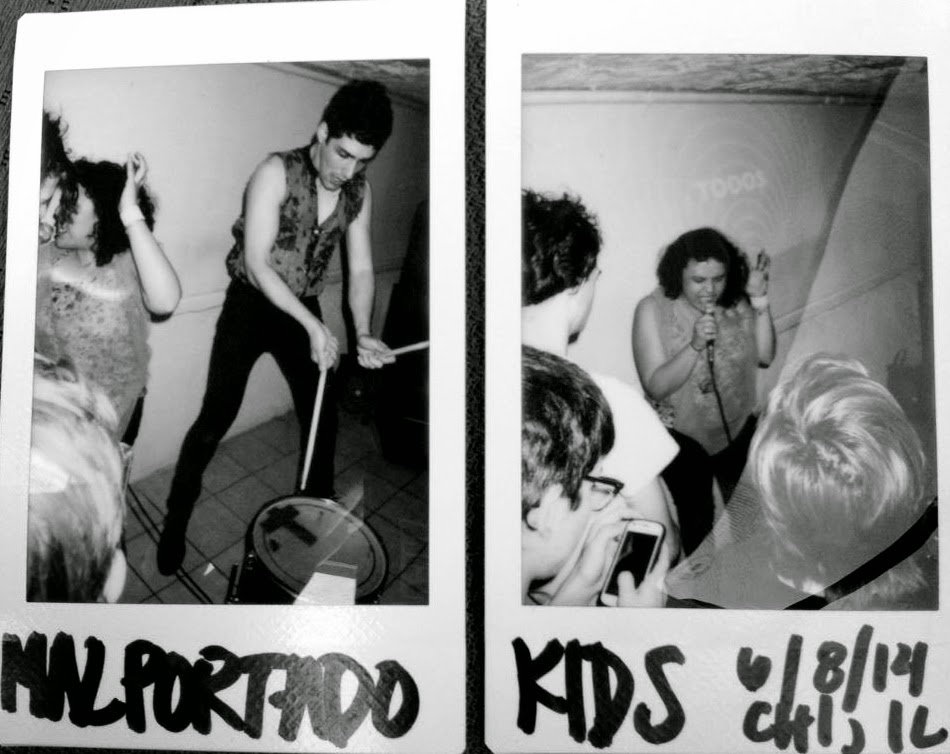No Pity for Boredom: An Interview with Downtown Boys
Printed in Antigravity July 2014.
Remember the days when punk bands sang with conviction about everything that wasn’t right with the world? Corporate exploitation of land and people, poverty, shitty landlord-renter or employer-employee dynamics, the lies inherent in mainstream media reporting, war, sexism, racism, homophobia... well, thanks to bands like Downtown Boys, those days aren’t over. They combine fierce politics with a dancey art punk aesthetic, complete with saxophones and strong vocals by Victoria Ruiz, to make you move your body and open your eyes. And the thing is, it isn’t all just talk; this group of musicians actually walk the walk by being politically active in the towns they live in, whether through community organizing or education. As guitarist/vocalist Joey DeFrancesco (ex-member of What Cheer? Brigade) points out in this interview, punk isn’t just an aesthetic, it can be a way of tying art to politics. Punk politics can and have lead to actual social change. Downtown Boys show us how it’s done in 2014.
New Orleans is a big marching band town and our love of brass instruments sometimes trickles down into the punk scene. In other words, people will be stoked that there’s saxophones in your band. Was it your past involvement in What Cheer? Brigade that moved you to include horns in Downtown Boys?
Joey DeFrancesco: This is an interesting question and never something we've been asked before! A few of us are actually in What Cheer? and are heavily influenced by the brass traditions in New Orleans, Balkans and Mexico, and all over. We love the energy created by lots of musicians and by horn sections in particular. I'd say more than What Cheer? though, what we thought about in creating this band are the free jazz or punk uses of saxophones, so like Sun Ra, Art Ensemble of Chicago, John Zorn, and so on. These are some of our favorite groups and I think some of the most powerful political music out there. This kind of abstracted human voice screaming through the horn fits well with what we're trying to say.
 Many artists who sing about politics in their bands don’t actually do any social justice work in the towns they live in, but a couple of you guys were actually involved in organizing hotel workers in Providence?
Many artists who sing about politics in their bands don’t actually do any social justice work in the towns they live in, but a couple of you guys were actually involved in organizing hotel workers in Providence?
JD: Yes, we're all involved in organizing or community work in some capacity. Me and Victoria met while working at the Renaissance Providence Hotel—which is currently under a worker-called boycott so don't stay there!—and became deeply involved in worker organizing there. We're both still very involved in the campaigns at the Renaissance and at other hotels in Providence. Emmett [Fitzgerald, tenor sax] has been deeply involved in prison justice campaigns and does journalism around environmental justice issues. Dan [Schleifer, bass] and Norlan [Olivo, drums] have worked for a while with New Urban Arts, an amazing arts and music after school program for Providence youth. We all very much act on what we talk about in our music.
Victoria Ruiz: I’m not doing any labor organizing [currently], but I just finished a job as a caseworker at the public defender to work on a bank-worker campaign for Make the Road New York [a Latino and working class community organizing group].
"...What we thought about in creating this band are the free jazz or punk uses of saxophones, so like Sun Ra, Art Ensemble of Chicago, John Zorn, and so on. These are some of our favorite groups and I think some of the most powerful political music out there."
 In a recent interview with Impose Magazine, Joey is quoted as saying, “Punk as an aesthetic and individualistic lifestyle means nothing. Punk as an ethics [of] collectivism, anti-oppression and action can and should imbue everything from the stage to the picket line, but we have to make it mean that.” Well said! Do you think political art can help motivate people to political action?
In a recent interview with Impose Magazine, Joey is quoted as saying, “Punk as an aesthetic and individualistic lifestyle means nothing. Punk as an ethics [of] collectivism, anti-oppression and action can and should imbue everything from the stage to the picket line, but we have to make it mean that.” Well said! Do you think political art can help motivate people to political action?
JD: We talk a lot about this in the car on tour actually about when people ask "How important is culture?" as opposed to like hard political organizing or something. And it's often like, "Hey, it's kind of a strange question to begin with because we shouldn't divide culture from organizing and everything else." We often fall into this trap of dividing culture from everyday life, as if culture is something that stops at the gallery door or the stage. This is what capitalism wants culture to be—a neatly separated experience that you consume and then move on. Truly revolutionary art or music reaches beyond where it's supposed to be confined and inspires you to take action at work, against the people you who are putting you down, and so on. I don't know if we achieve this, but we're aiming for this kind of total culture.
In New Orleans, I perceive a division between the punk scene, the activist scene, the queer scene, etc., whereas maybe 10 to 15 years ago, I saw these scenes more united in other cities. Do you see those scene divisions in Providence?
JD: Yes, the scenes are sadly too divided. A good discussion of this is probably beyond the scope of this interview, as all these scenes have many scenes within themselves and all have aspects which are oppressive and alienating to the other groups and that should be analyzed at length. Just to talk about one aspect, I think the punk scene too often focuses on a self-serving individualism. Running as far away from society as possible, focusing on lifestyle issues like biking and consumer-sided food activism, and so on. None of this is bad in and of itself, but its flip side is often a lack of solidarity with anyone outside the punk scene. Why are there so few punks at picket lines? Why so few punks door-knocking or storming city hall? It's complicated, and everyone has different levels of access to organizing spaces; but if we're serious about creating a new world, we've got to get more serious about uniting with the radical elements in the existing world.
"Truly revolutionary art or music reaches beyond where it's supposed to be confined and inspires you to take action at work, against the people you who are putting you down, and so on. I don't know if we achieve this, but we're aiming for this kind of total culture."
What are your favorite political bands from the past and present?
JD: MIA, Los Prisioneros, Crass, Priests, Shady Hawkins, DJ Haram, to name a few.
VR: Selena, The Fugees, Mana, The Cure, Fugazi, Sun Ra!
Victoria, tell us about the zine you make. Will you have it with you on tour?
VR: I will have the zine, yes! It’s called Brown is Beautiful. I wanted to put something together that was a collaboration of brown friends and white "allies" that are part of my inspiration and thought process. We were about to go on tour with EMA and play a lot of bars to a lot of people we’d never met or interacted with. I wanted people to be able to get some information on where our band is coming from! I believe in political education and Afro-futurism as a liberation pedagogy and I wanted to create something around that.
VR: This is my first band! I was always real into performing, though. Anytime “Bidi Bidi Bom Bom” [by Selena] came on the radio when I was a kid, I would grab a bottle or hairbrush and my family would watch me sing along. I always loved going to shows and that's how I got involved in Downtown Boys. They had actually played a couple shows without me, and I'd go and pretend I knew the lyrics and dance and go crazy. One day I told Joey I wanted to be in a band, and he was like, "Be in this one."
Downtown Boys play The Wherehouse on Monday, July 14th at 7 p.m., with Panty Waste and Room 101. Check out noladiy.org and downtownboys.bandcamp.com for more info.






Comments
Post a Comment